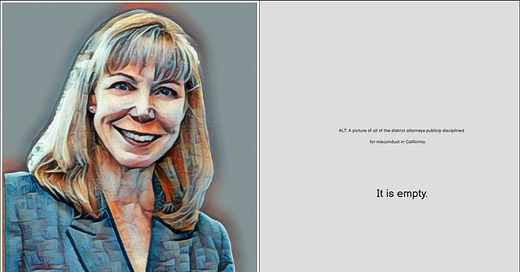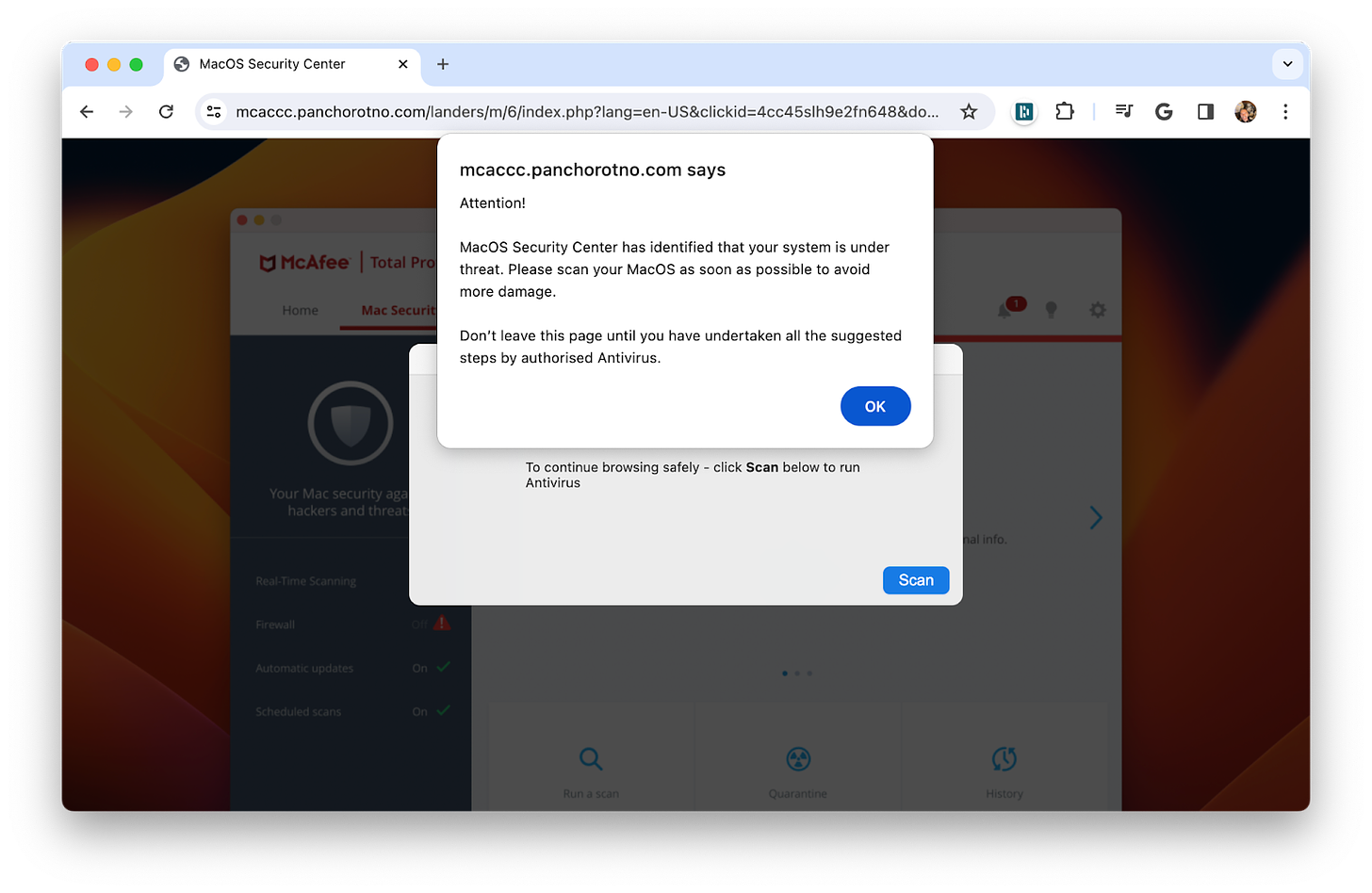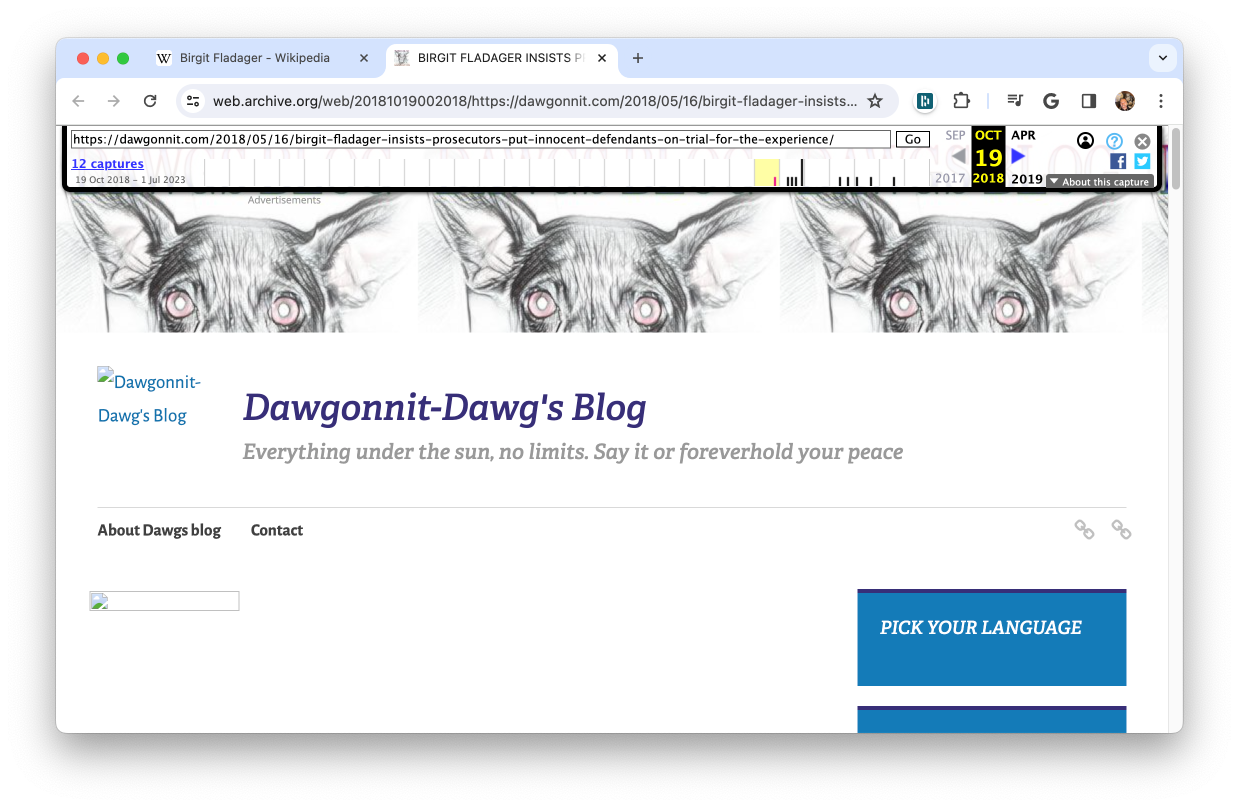The Hunt - Chapter 7: What They Don't Have in Modesto
Birgit Fladager served as Stanislaus County District Attorney for seventeen years. Whatever she left behind, it didn't include a conviction integrity unit.
Former Stanislaus County District Attorney, Birgit Fladager (left) and a picture of district attorneys publicly disciplined for prosecutorial misconduct in California (right).
This is Chapter 7 in The Hunt, our ongoing serial. Read Chapter 6 here.
“This makes me so upset that district attorneys are able to get away with this, homie,” Justin lamented, continuing, “it’s such bullshit, none of them held accountable.”
I interrupted him, recalling a loose end1. I’d mentioned it once before, several weeks earlier. There hadn’t been a dick joke appended2, so I assumed it’d escaped his notice.
“Birgit Fladager’s Wikipedia. There’s something odd about one of the references…”
And off he went like a man on a mission. One that, perhaps, he could execute on his phone, on the toilet.
The Video
*wrestles the keyboard away*
Loose ends she says. Dick jokes. Toilets. I am a professional3, I’ll have you know.
Let’s warm up our investigating fingers and see what we can find out. We will, unfortunately, have to leave the art of Wikipedia research, the backtracking of its edits and all the glorious ways that people can show their ass on this wonderful site for another time. We have a need for speed.
Let’s head over to the Wikipedia page for our least favorite district attorney, Birgit Fladager4 and zip down to footnote #12 which looks like so:
Now, as happens many times in our careers, we get excited, we click the link and then…we get served some porn and shitty antivirus ads, not a damning video from 2018 that we really want.
Nothing is easy in this business is it? However, the amazingly talented Craig Silverman had a previous Substack article5 on installing the Wayback Machine browser extension6, so that you can easily navigate or open links in the Wayback machine whenever you encounter a broken link or “404” page. If I right-click on the reference #12 link in Wikipedia, and from the Wayback Machine menu select: Oldest Version.

This will kick open the oldest archived page of the link, if the Wayback Machine has it. In this case, we were very fortunate that they did in fact crawl and preserve this website7.
Have a watch of the video twice. First, just watch it through and absorb it. The funniest part to me, the second time through, is how physically agitated the other three attorneys are becoming as DA Fladager is talking.
Priceless. If it wasn’t so disgusting, infuriating and absolutely wrong.
Up yours, Somebody Else’s Lawyer. Who’s the king now?8 Here's your video.
*hands the keyboard back*
Somebody Else’s Lawyer: Back on her bullshit
If that video turns your stomach, it should.
Birgit Fladager was first elected as the District Attorney for Stanislaus County in 2006. She served until January 3rd, 2023. That’s seventeen years of trials, convictions, prosecutions, and pleas. Potentially, seventeen years of human beings – actually innocent human beings – whose lives were disrupted so junior prosecutors could get their legs under them in court.
Prosecutors are special.
And that’s not right. Because prosecutors are special.
Not in that they hold the power of life or death over citizens and residents of their jurisdictions, albeit wielded with the studied gravitas of a used-car salesman who insists that the little lady needs an automatic transmission, heated seats and to plead quickly to a low-level felony, sentence suspended, if she keeps her nose clean.
But, in that they have duties that other attorneys do not.
Prosecutors have “the responsibility of a minister of justice and not simply that of an advocate. This responsibility carries with it specific obligations to see that the defendant is accorded procedural justice, that guilt is decided upon the basis of sufficient evidence, and that special precautions are taken to prevent and to rectify the conviction of innocent persons,9” meaning, they can’t insist subordinates try weak cases for practice.
They can’t do, in other words, what Birgit Fladager said she did.
ABA Model Rule 3.8 – and California R. Prof. C. 3.8
The American Bar Association first promulgated Model Rule 3.8, titled “Special Responsibilities of Prosecutors” in 1983.
Rule 3.810, in broad strokes, prohibits prosecutors from (1) pursuing charges not supported by probable cause, (2) interfering with the right to counsel or seeking waivers of important pre-trial rights from the accused, and (3) making certain statements to the media.
Relevant in the post-conviction context, Rule 3.8 imposes an affirmative duty on prosecutors to remedy wrongful convictions. As adopted in California, the relevant sections provide, in pertinent part11:
(f) When a prosecutor knows* of new, credible and material evidence creating a reasonable* likelihood that a convicted defendant did not commit an offense of which the defendant was convicted, the prosecutor shall12: (1) promptly disclose that evidence to an appropriate court or authority, and (2) if the conviction was obtained in the prosecutor’s jurisdiction, (i) promptly disclose that evidence to the defendant unless a court authorizes delay, and (ii) undertake further investigation, or make reasonable* efforts to cause an investigation, to determine whether the defendant was convicted of an offense that the defendant did not commit.
(g) When a prosecutor knows* of clear and convincing evidence establishing that a defendant in the prosecutor’s jurisdiction was convicted of an offense that the defendant did not commit, the prosecutor shall seek to remedy the conviction.13
What they don’t have in Modesto
Starting in Dallas, Texas, in 200714 – and in some part in response to the flood of exonerations resulting from the debunking of “bad” science and the increased accessibility of DNA testing – many district attorneys and county prosecutors have founded “conviction integrity units” to address claims of actual innocence and wrongful conviction.
Stanislaus County, California is not among them. Neither Ms. Fladager nor her successor saw fit to found a unit to address post-conviction claims of actual innocence. This does not, however, mean that the prosecutors in Stanislaus are exempt from Cal. R. Prof. C. 3.8(f)-(g).
Rather, it means they simply haven’t taken the time to design their own forms, implement standards, or designate staff to process “actual innocence” claims, like their colleagues in the counties of Ventura, Contra Costa, or even Los Angeles.
Lack of a fillable form, designated contact, or concern for a county official’s efficient workflow, though, shouldn’t keep an innocent person in jail. Therefore, should such a thing be required, we’ve taken the liberty of drafting a letter.15
Note: This is a form letter only. It is not legal advice. It is not representation. No statements are made concerning whether use of this letter is a good idea16. For the love of god please consult with a competent attorney in your jurisdiction before voluntarily communicating with law enforcement, prosecutors, or district attorneys.
[Your Address]
Jeff Laugero
Stanislaus District Attorney
832 12th Street, Suite 300
Modesto, California 95354
Dear Attorney Laugero:
It is my understanding that the Stanislaus County District Attorney’s Office does not maintain a conviction integrity unit at this time. If I am mistaken, please direct this letter to the attention of the attorney or unit within your office that handles wrongful conviction and actual innocence matters.
[ACCUSED NAME] was prosecuted in Stanislaus County in [year]. [Accused name] is currently serving a sentence of [SENTENCE], at [PRISON]. [Accused name] is actually innocent of the crime of [CRIME].
I am providing you this information, as pursuant to Cal. R. Prof. C. 3.8(f)-(g), you have an obligation to investigate his innocence, and remedy his conviction.
The basis for my letter is outlined as follows:
[DESCRIBE ACTUAL CLAIM OF INNOCENCE]
I hope that you will find my letter informative and I look forward to hearing from you at your earliest convenience. If I do not hear from you within the next thirty days, I will follow up.
Thank you for your time and attention.
Sincerely,
[YOUR NAME]
CC: Public Inquiry Unit
Office of the Attorney General17
P.O. Box 944255
Sacramento, CA 94244-2550
“If you don’t know what you’re doing, know everything else,” is advice I was given, long ago, by an attorney who insisted he wasn’t mentoring me, wouldn’t mentor me, and insisted mentoring is ego-driven bullshit.
Still. It’s a philosophy that actually works even after you know what you’re doing. Always, always know everything else. Any knowable unknown is a loose end.
Hey! That’s not fair, I had COVID and I also remember statements that end in fart jokes too.
First of many disclaimers from Somebody Else’s Lawyer: Justin may be a professional. He is not an attorney. I am not your attorney. And none of this is legal advice. None of it is, in fact, advice.
Wikipedia contributors. (2023, August 3). Birgit Fladager. In Wikipedia, The Free Encyclopedia. Retrieved 14:39, January 16, 2024, from https://en.wikipedia.org/w/index.php?title=Birgit_Fladager&oldid=1168617467
From SEL: I stand corrected. A browser extension precludes toilet investigation; this must have taken more time and less fiber. This is also really cool.
From SEL: The guy who made the browser extension, I believe, takes this one.
Comment 1 to Cal. R. Prof. C. 3.8 (2020)
Rule 3.8 also requires disclosure of evidence and information to the defense. Although California had not adopted a version of the ABA Model Rules until 2018, the California Supreme Court recognized the ethical obligations codified in that rule prior to 2018. See In re Lawley, 42 Cal. 4th 1231, 1246, 179 P.3d 891, 902 (2008) (discussing the ethical obligations of a prosecutor with regard to exculpatory evidence, and citing ABA Model Rule 3.8).
Fuck, that’s lawyerly. But it’s functional language. My use of “in pertinent part” here lets you, the reader, know that I’ve taken only that chunk relevant to what I’m talking about right here. I’m not trying to trick you and make you believe that the Rule starts with subsection (f).
“Shall” means that this directive is mandatory, in contrast to “may,” which means “if you want.”
Do not use this for the unauthorized practice of law. This is not legal advice, or representation. It is a form letter that uses terms from a statute.
It very, very likely may not be a good idea. Post-conviction practice is a minefield. Communication with law enforcement, more so. Consult a lawyer.
Additionally, none of the above is legal advice. Somebody Else’s Lawyer is not your lawyer. She is not a criminal attorney; she is not licensed in California. This is not an attorney advertisement. This is not an offer of representation.
In February of 2023, California Attorney General Rob Bonta announced that he was founding a “Post-Conviction Justice Unit” within the California Department of Justice, which would step in where county prosecutors hadn’t established their own conviction integrity units. As it seems he hasn’t actually gotten around to getting them their own contact information, staff, or P.O. Box, we’re sure he wouldn’t mind if you used this one.









